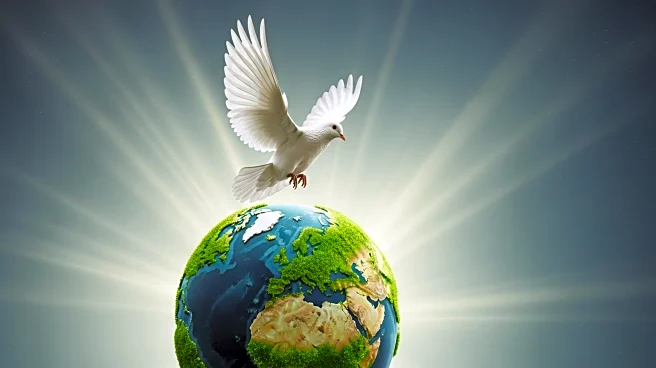What is the story about?
What's Happening?
On October 1, 2025, Pope Leo delivered a significant address at Castel Gandolfo, emphasizing the need for unity in tackling climate change. This speech marked the 10th anniversary of Laudato Si, a papal encyclical by Pope Francis that called for environmental stewardship. Pope Leo highlighted the ongoing relevance of the challenges identified in Laudato Si, urging society to pressure governments for stricter environmental regulations. He criticized the divisive rhetoric of some leaders, implicitly referencing a recent speech by a U.S. president dismissing climate change. Pope Leo's message was reinforced by symbolic gestures, such as the presence of melting glacial ice on stage, underscoring the urgency of the environmental crisis.
Why It's Important?
Pope Leo's address underscores the critical role of religious and moral leadership in the global climate discourse. By calling for unity, he challenges political and societal divisions that hinder effective climate action. His message is particularly significant in the U.S., where climate change remains a contentious issue. The Pope's stance may influence Catholic communities and beyond, encouraging grassroots advocacy for environmental policies. This could lead to increased pressure on U.S. policymakers to adopt more rigorous climate measures, potentially impacting industries reliant on fossil fuels and promoting renewable energy investments.
What's Next?
Pope Leo's call for action may prompt religious and community leaders to advocate more vigorously for environmental policies. This could lead to increased activism and public pressure on governments to implement sustainable practices. The Vatican's plan to create a solar farm, aiming to make Vatican City carbon-neutral, sets a precedent for other states and organizations. As the global climate conversation continues, the Pope's influence may encourage broader international cooperation, despite current geopolitical tensions.
Beyond the Headlines
Pope Leo's address highlights the ethical dimension of climate change, framing environmental stewardship as a moral obligation. This perspective may resonate with diverse religious and cultural groups, fostering a more inclusive dialogue on climate action. The Pope's emphasis on unity and care for creation could inspire long-term shifts in societal values, prioritizing sustainability and collective responsibility over individual or national interests.















